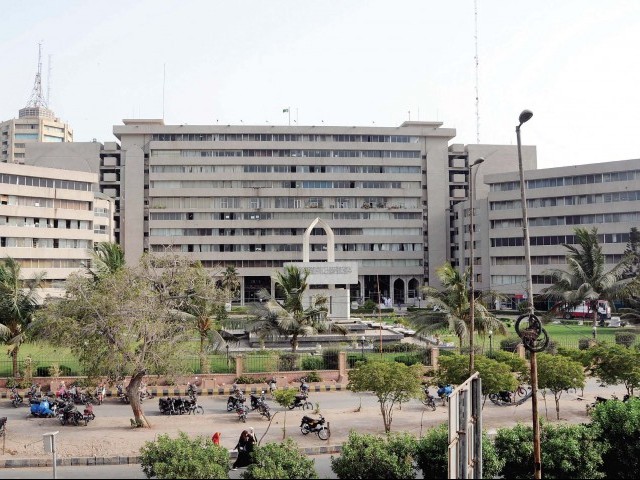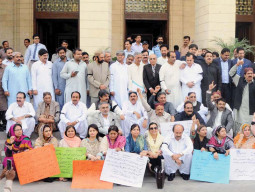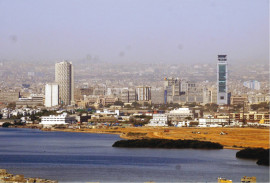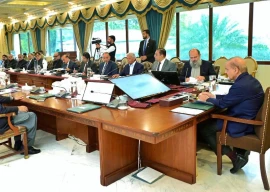
KARACHI:
Revival of the defunct Karachi Development Authority (KDA) is bound to rob the Karachi Metropolitan Corporation (KMC) of the little powers it had after it lost most of its revenue-generating departments to the district municipal corporations.
KDA was merged into KMC in 2002 during the tenure of General (retd) Pervez Musharraf.
Regularising slums: Call for paradigm shift in urban planning
The consolidated city district government was placed under the city nazim, who had control over all affairs of the city. However, two other development agencies in the city — Malir and Lyari development authorities — were retained as separate entities.
On March 21, the Sindh Assembly passed the bill to revive KDA after 14 years. The bill has been sent to Sindh Governor Dr Ishratul Ebad Khan to sign and convert into a law.
The governor has yet to sign the bill, said the assembly secretary.
Eviction from Civic Centre
Perhaps the foremost weakening of KMC's strength will come from the fact that it will no longer call Civic Centre - the head offices of the city's negligible local government - its home. The building belonged to the KDA and, according to a senior KMC officer who wished to remain anonymous, KMC will either have to pay rent to KDA to continue its operations from Civic Centre or it will have to shift to the old KMC building on MA Jinnah Road.
[Un]protected heritage: Pedestrian bridge obscures DJ Science College façade
Half of the departments that come under KMC used to be located at the old KMC building and the rest were somewhere at Guru Mandir, the official explained. "All the departments were scattered," he said, adding that they all came under one roof at Civic Centre when KDA and KMC were merged in 2002.
Once the law is notified, the separation will come into effect. "Both the organisations will be separated most likely after the budget is announced for this year," said KMC's senior legislation adviser Saeed Akhtar. According to him, the construction and the engineering departments of KDA will also be revived and will work alongside KMC's engineering department.
Dwindling resources
Sources of revenue generation for the KMC have already taken a hit since it lost the local tax department to the district municipal corporations (DMCs). This means that the 33 streets that came under KMC will be maintained by it but the revenue generated from billboards on any of these streets will be pocketed by the DMCs. "The power of the KMC administrator or the city mayor will be merely symbolic," said a KMC officer.
Similar is the case with markets that came under the corporation. All those markets that were under KMC, such as Lea Market, Empress Market and Bohri Bazaar, will remain so, said KMC estate department director Muneer Ali Khan.
According to the KDA's estate and enforcement director Jameel Ahmed Baloch, the properties and liabilities of both KMC and KDA were kept separate despite the merger. "Our budget used to be separate and our records were maintained separately," he said.
However, a long-serving KDA officer who wished to remain anonymous, pointed out that KMC will have sufficient resources at its disposal even after the revival of KDA. KMC will have a major source of revenue, such as its land and estate department that it can use effectively, he said. "Rulers at that time [when KDA and KMC were merged] wanted to create an empire and that's why they merged both the organisations," he said.
Greener city: Urban forestry to counter air pollution in Karachi
Redundant KDA
When the KDA was formed in 1958, new sectors were to develop in the city, said former KMC administrator Fahim Zaman. There is little left to be done in Karachi in terms of development.
The city now needs maintenance, he said.
What development work can KDA actually do when the authorities for sewage, water, building control and mass transit have already been separated and placed under the direct command of the chief minister? According to Zaman, KDA along with Lyari and Malir development authorities will add to the ever-increasing number of civic agencies in the city. Resources will be further divided and corruption will become easier.
Since KMC comprises elected representatives, there are lesser chances of corruption in its affairs. The same cannot be said for the development authorities, which will comprise bureaucrats heeding to the whims and wishes of the local government minister.

Published in The Express Tribune, April 5th, 2016.




























































COMMENTS (1)
Comments are moderated and generally will be posted if they are on-topic and not abusive.
For more information, please see our Comments FAQ